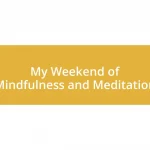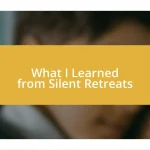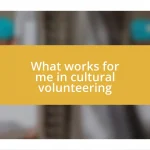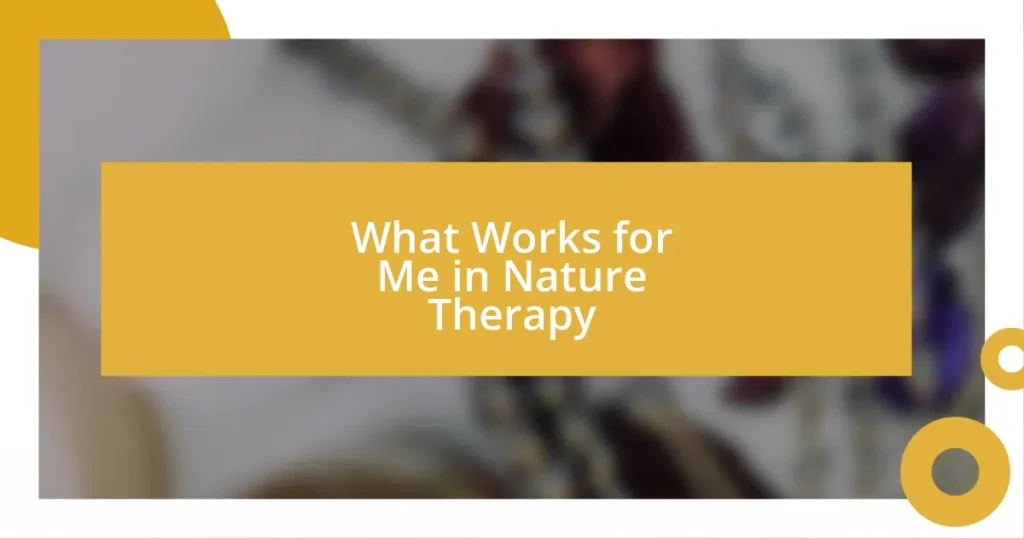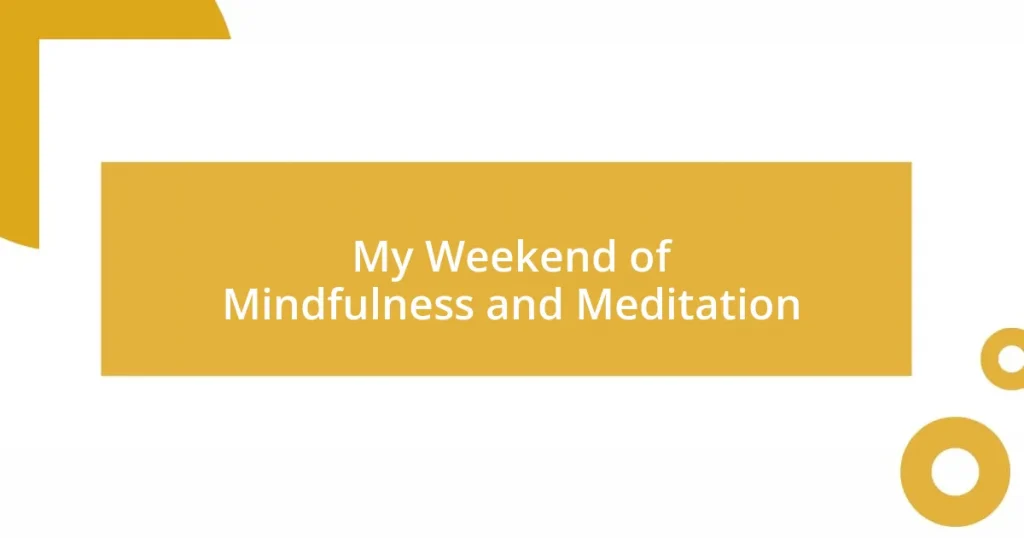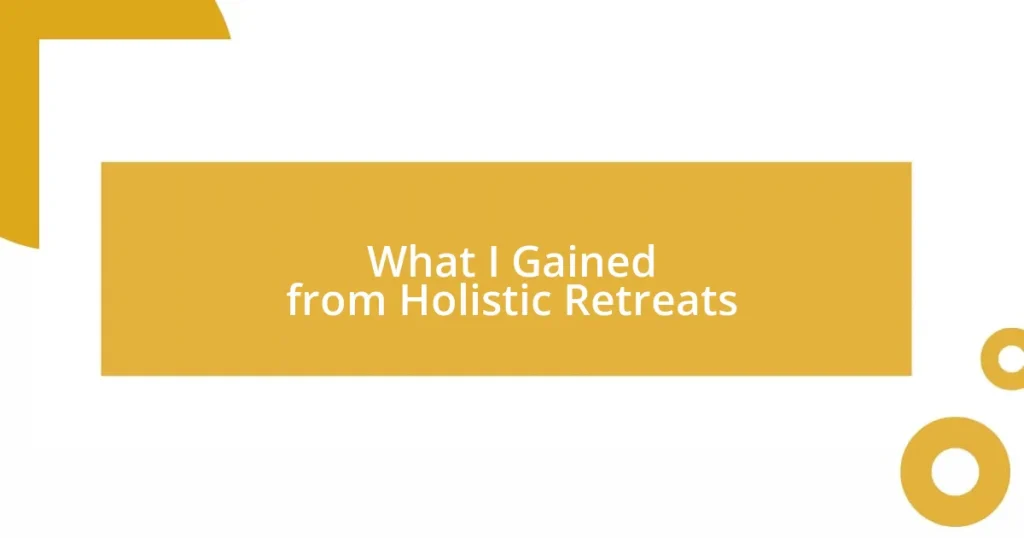Key takeaways:
- Cultural immersion enhances empathy and understanding by allowing individuals to experience joys and challenges of different cultures firsthand.
- Actively engaging with locals through participation in events, language lessons, and shared meals fosters deeper connections and insights into community values.
- Food experiences serve as a gateway to cultural understanding, revealing history, traditions, and social bonds within communities.
- Embracing local customs and traditions provides unique glimpses into a culture’s identity and fosters personal growth through shared rituals and practices.
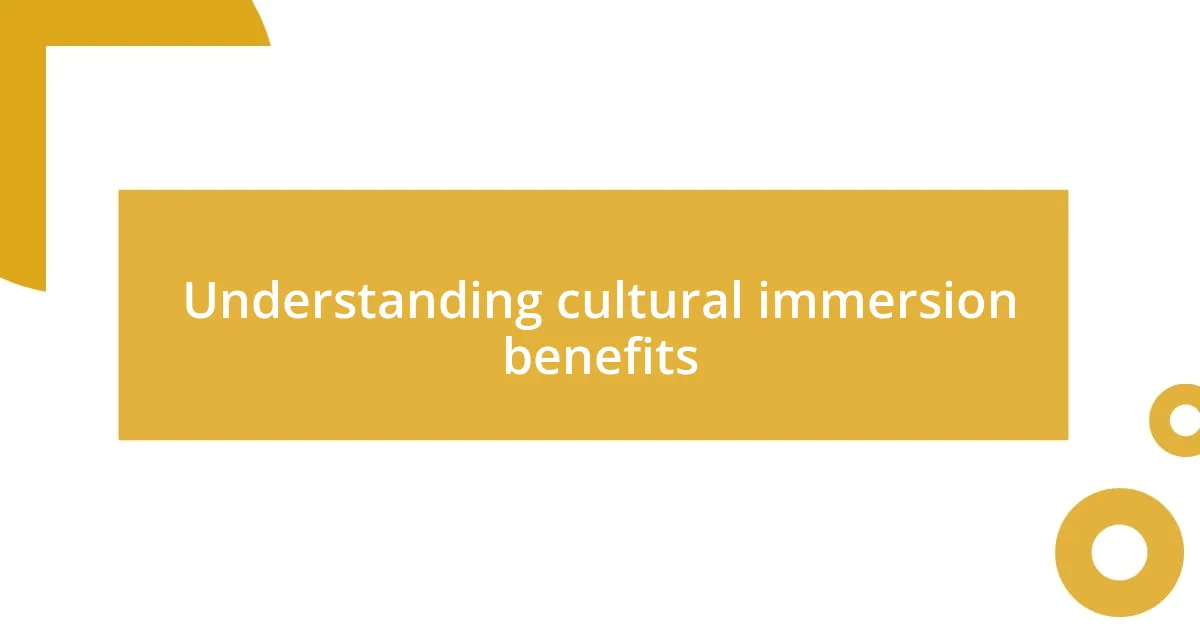
Understanding cultural immersion benefits
Cultural immersion offers a unique opportunity to expand our worldview. I’ll never forget my first experience living with a host family in Spain; it wasn’t just about language learning but the warmth of shared meals and stories that profoundly impacted my understanding of community and connection. Have you ever noticed how much richer interactions become when you truly engage with another culture?
One of the most striking benefits is the ability to develop empathy. When we immerse ourselves in a new culture, we step into someone else’s shoes and experience their joys, challenges, and traditions firsthand. There was a moment during a festival in India where I found myself overwhelmed by the vibrancy of colors and sounds—each element telling a story. It made me realize how different yet similar we all are at our core. Have you ever felt that sense of unity in diversity?
Furthermore, cultural immersion can foster adaptability and resilience. I recall navigating public transportation in a foreign city where everything seemed foreign and daunting at first. As I learned to decipher the local customs and language, I discovered a newfound confidence in overcoming challenges. Doesn’t it make you wonder how stepping out of our comfort zone can lead to such personal growth?
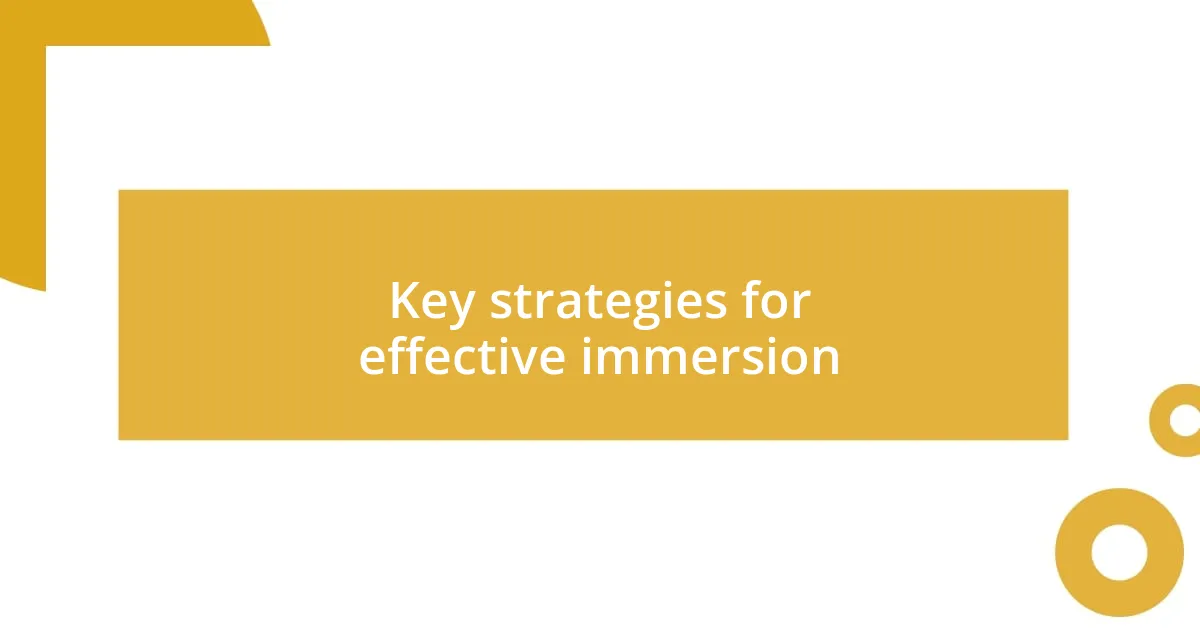
Key strategies for effective immersion
When it comes to effective cultural immersion, I’ve found that actively engaging with locals is crucial. It was during my visit to Japan that I learned the importance of just saying “yes” to invitations. Whether it was an impromptu dinner with a family or a community event, these experiences deepened my understanding and appreciation of their customs. Nothing compares to the joy of sharing laughter over a home-cooked meal, making connections that transcend language barriers.
To truly immerse yourself, consider these key strategies:
- Participate in Local Events: Attend festivals, markets, and community gatherings to experience the culture firsthand.
- Take Language Lessons: Learning basic phrases opens doors and shows respect for the culture.
- Volunteer: Helping out in local projects deepens connections and provides insight into community values.
- Document Your Journey: Keep a journal of your thoughts and experiences, reflecting on your growth.
- Be Open and Curious: Embrace the unfamiliar and ask questions; it’s one of the best ways to learn.
I remember feeling completely out of my element when I tried zumba with local women in Colombia. I stumbled through the steps, but their infectious energy made me feel like part of their world. That moment taught me that vulnerability can lead to profound cultural insights.
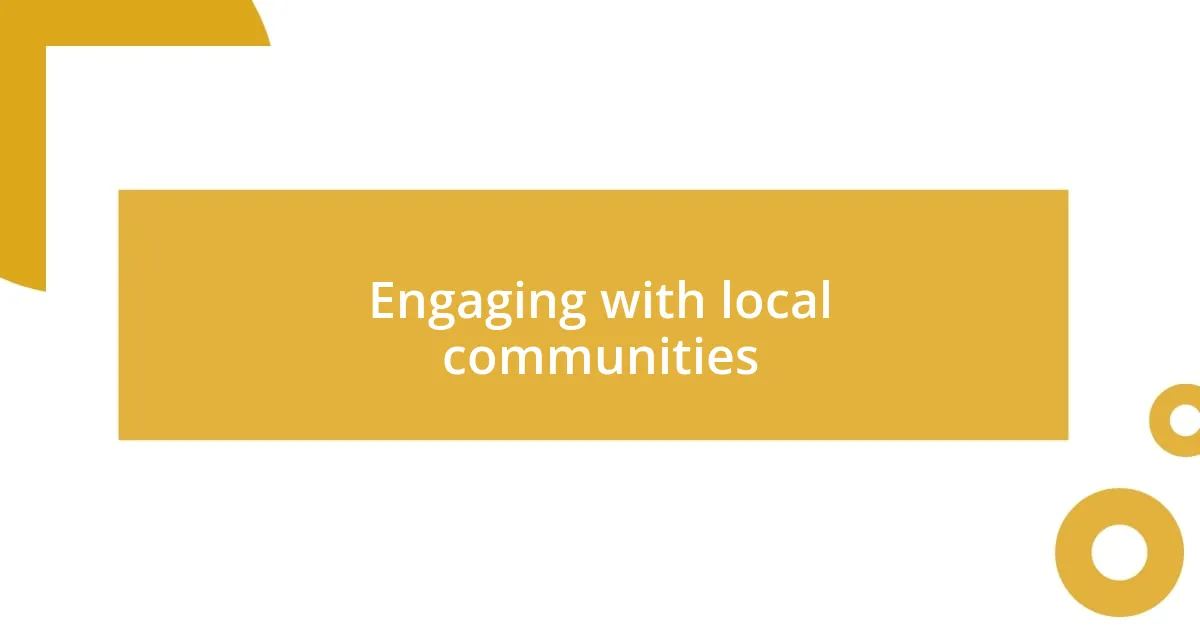
Engaging with local communities
Engaging with local communities is one of the most enriching aspects of cultural immersion. I vividly recall a rainy afternoon in a village in Ghana when I joined a local group making traditional crafts. As we laughed and shared stories, I realized that these moments of creativity often hold the essence of a culture. It struck me that sometimes the simplest activities can foster the deepest connections. Have you ever connected over an activity, where the joy of collaboration felt like a bridge between your worlds?
I’ve also found that joining community projects can pave the way for genuine interactions. Once, while volunteering at a wildlife conservation initiative in Australia, I forged friendships with locals who shared their rich narratives about their land and heritage. Listening to their stories taught me invaluable lessons about respect for nature and community solidarity. How do you think acts of service can create lasting bonds with others? From my perspective, they can transform strangers into friends united by a shared goal.
Another powerful way to engage with locals is through food. I remember sitting down in a bustling market in Morocco, savoring a homemade tagine while chatting with the vendor about its traditional significance. The flavors were exquisite, but what truly enriched the experience was the context behind every ingredient. It made me contemplate how food is often a gateway to understanding a culture’s history and values. Isn’t it fascinating how a meal can tell a story? I believe that engaging with local cuisines offers profound insights into a culture’s heart and soul.
| Activity | Benefits |
|---|---|
| Craft Workshops | Fosters creativity and connection |
| Volunteering | Builds friendships through shared goals |
| Culinary Experiences | Provides insight into cultural traditions |
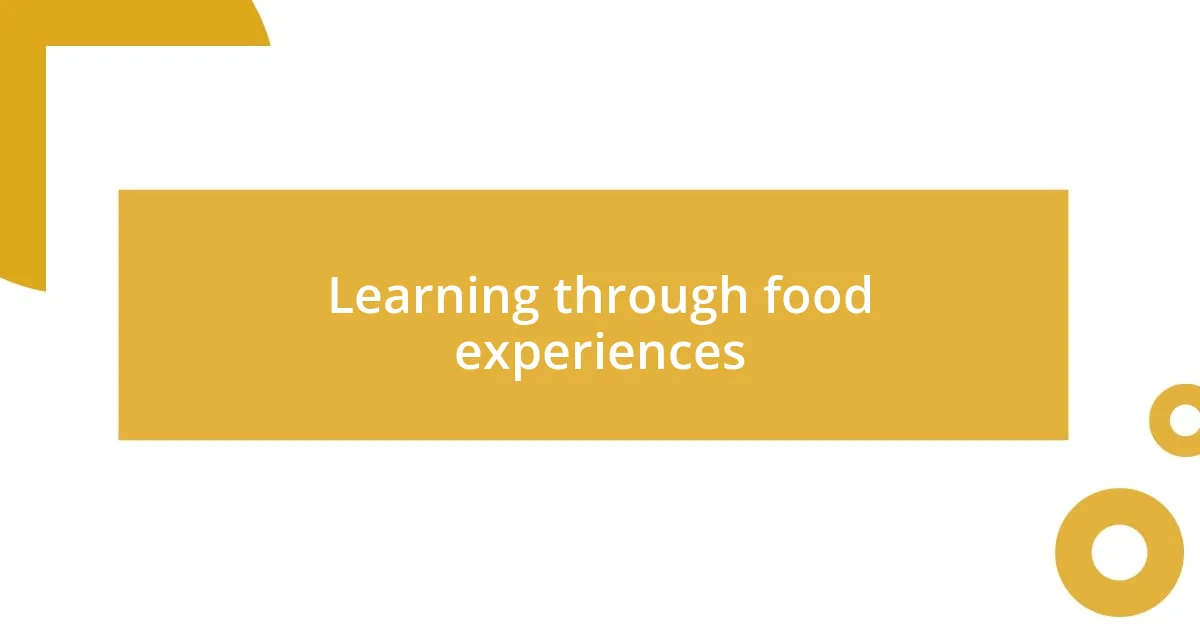
Learning through food experiences
Food experiences are an incredible gateway to cultural understanding. I remember visiting a charming little eatery in Florence, where I found myself surrounded by the tantalizing aroma of freshly made pasta. As I helped the chef knead the dough, I absorbed not just the technique but the stories shared about family traditions passed down through generations. It made me wonder: how often does a simple meal reflect a deep-rooted history?
During another trip to Thailand, I participated in a cooking class that opened my eyes to the balance of flavors fundamental in Thai cuisine. As we chopped herbs and mixed sauces, our instructor shared how specific ingredients are believed to bring harmony and luck. This experience was more than just about cooking; it was a lesson in cultural philosophy. Have you ever considered how every dish carries with it the ethos of its people?
In Mexico, I experienced a vibrant street food festival that showed me how food truly binds communities together. The excitement was palpable as flavors danced on the tongue—from spicy tacos to sweet churros. Chatting with vendors, I learned that each recipe had hidden stories, often tied to celebrations and family gatherings. This made me realize that beyond nourishment, food serves as a powerful storyteller, weaving narratives of heritage and identity. Honestly, isn’t it amazing how a shared meal can foster a sense of belonging, even in unfamiliar surroundings?
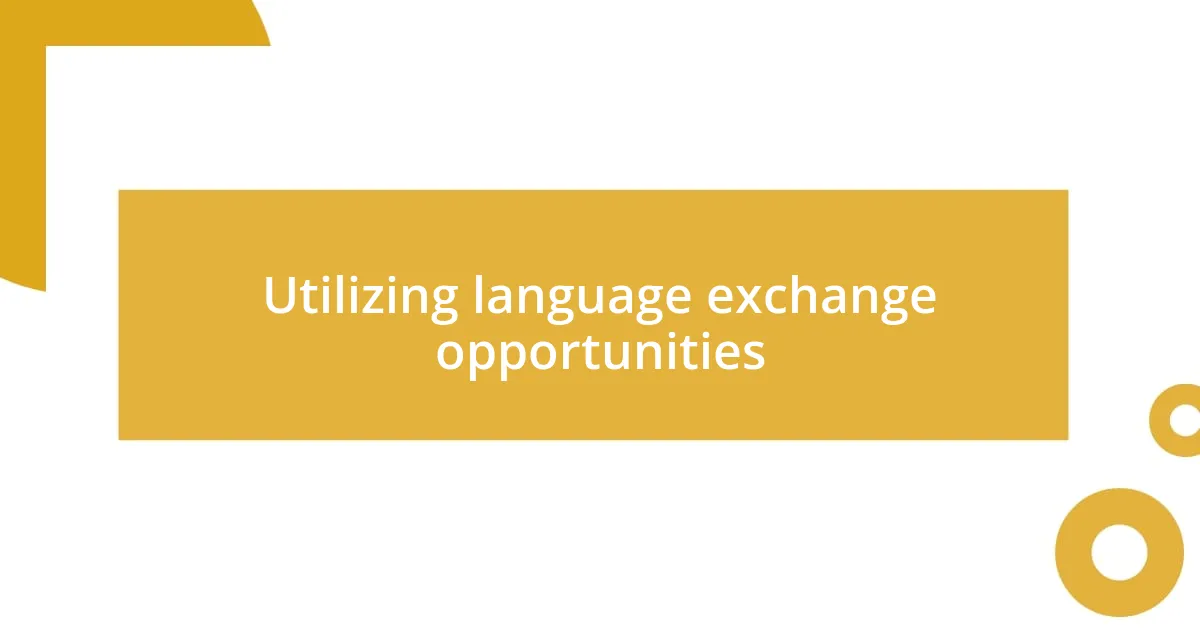
Utilizing language exchange opportunities
Utilizing language exchange opportunities has opened up new dimensions in my cultural immersion experiences. I recall sitting in a cozy café in Barcelona, where I met a local student eager to practice English. As we stumbled through conversations, laughter erupted over our shared mistakes. It made me realize that language isn’t just about vocabulary; it’s also about connecting on a personal level. Have you ever found joy in miscommunication, only to see it blossom into genuine connection?
Participating in language exchange meetups has also been transformative for me. I remember a vibrant gathering in a small library where people from different backgrounds got together to practice their languages. One day, I partnered with a native Spanish speaker. As we navigated through cultural jokes and idioms, I learned how deeply language is intertwined with identity. This experience taught me that sharing not only our words but also parts of our lives leads to richer conversations. Isn’t it amazing how much you can learn about a culture through its language nuances?
Through these exchanges, I often find myself pondering the questions of cultural authenticity and expression. When I share the beauty of my language, especially expressions unique to my background, it feels like offering a piece of myself. I remember explaining a colloquial phrase to my conversation partner and the fascinated look on their face. This shared exploration ignites curiosity in ways that textbooks simply cannot replicate. What does it say about us when we dive into each other’s languages, uncovering the essence of our cultures in the process?
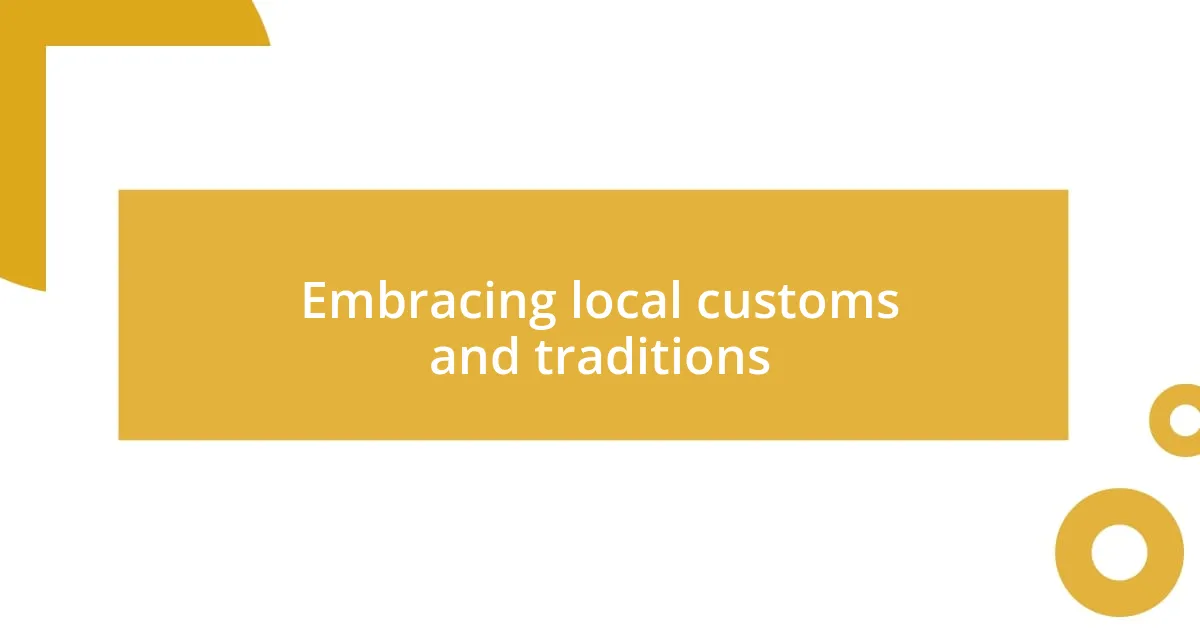
Embracing local customs and traditions
Embracing local customs and traditions can be one of the most enriching aspects of cultural immersion. I remember my first Diwali celebration in India, where the streets came alive with lights and laughter. The warmth of the community was infectious as we decorated homes with vibrant rangoli designs and exchanged sweets. It struck me then how customs shape the very fabric of social identity—wouldn’t you agree that participating in such cherished practices offers a unique glimpse into a culture’s heart?
During a visit to Japan, I was invited to a tea ceremony, which I initially thought would just be a quiet affair. Instead, it turned into a profound lesson in mindfulness and respect. Each movement of the host was deliberate, embodying centuries of tradition. I wondered, how often do we slow down and appreciate the art behind everyday rituals? This experience reminded me of the value of patience and presence in our fast-paced lives.
In Greece, I encountered the beautiful custom of breaking plates during special celebrations. When I first saw it, I was taken aback, thinking it was wasteful. However, I quickly learned that it’s a joyful expression of letting go of the past and welcoming new beginnings. Engaging in this practice was liberating; it made me reflect on what I carry with me and what I could let go of. Isn’t it interesting how local customs can act as both a unifier and a mirror to our own lives?

